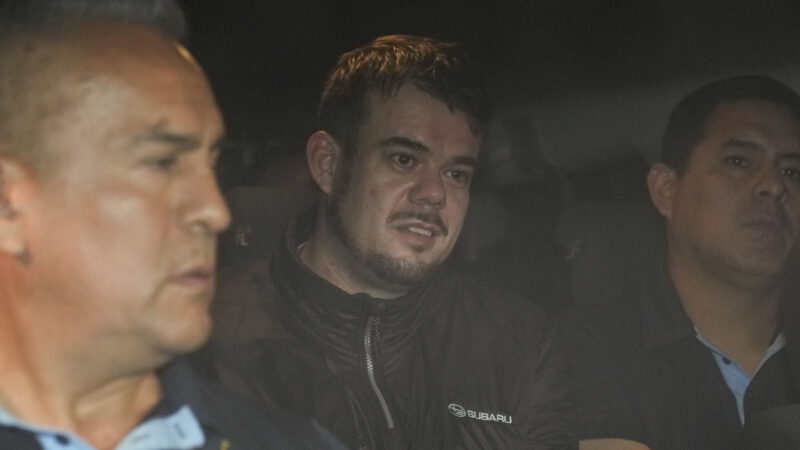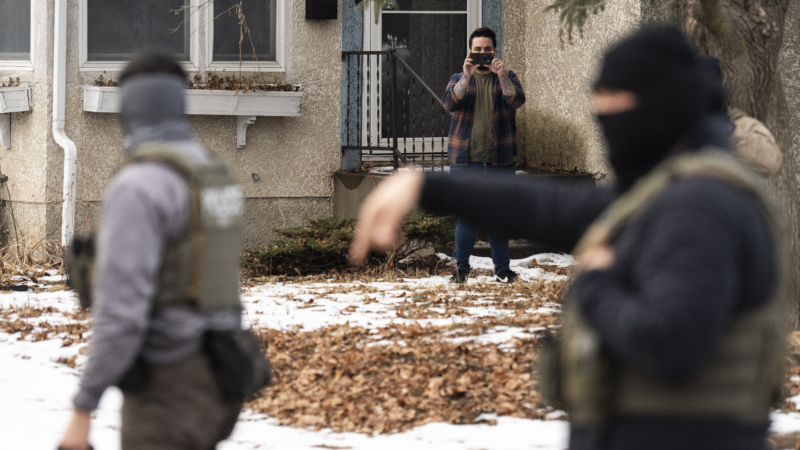Chief suspect in Natalee Holloway disappearance pleads not guilty to extortion charges
Dutch citizen Joran van der Sloot is driven in a police vehicle from the Ancon I maximum-security prison, outskirts of Lima, Peru, Thursday, June 8, 2023.
BIRMINGHAM, Ala. (AP) — Joran van der Sloot, the chief suspect in the 2005 disappearance of Natalee Holloway, pleaded not guilty Friday to federal charges that he tried to extort money from the missing teen’s mother in exchange for revealing the location of her body.
Van der Sloot, 35, was extradited to the United States on Thursday from Peru, where he is serving a 28-year prison sentence after confessing to killing a Peruvian woman. He was arraigned in Birmingham, not far from the suburb where Holloway grew up, in his first court appearance in the case.
Natalee’s mother, Beth Holloway, watched the brief proceeding from the third row of the courtroom. She stared occasionally at van der Sloot but showed no obvious emotion.
“For 18 years, I have lived with the unbearable pain of Natalee’s loss,” she said in a statement Thursday. “Each day has been filled with unanswered questions and a longing for justice that has eluded us at every turn. But today … I am hopeful that some small semblance of justice may finally be realized.”
Afterward, she hugged friends who had come to offer their support along with Natalee’s father and brother. She declined to comment to reporters outside the courthouse.
Shackled and wearing jeans and a white T-shirt, van der Sloot declined to use a Dutch interpreter offered to him at Friday’s arraignment. He sat beside his court-appointed attorney, Kevin Butler, who entered the not guilty pleas on his behalf.
Van der Sloot is charged with one count each of extortion and wire fraud — the only charges to have ever linked the Dutch citizen to Holloway’s disappearance on the Caribbean island of Aruba.
Natalee Holloway, 18, was on a high school graduation trip with classmates in Aruba when she vanished in 2005. She was last seen leaving a bar with van der Sloot, who was a student at an international school on the island. Van der Sloot was identified as a main suspect and detained weeks later for questioning, along with two Surinamese brothers, but no charges were filed in the case.
A judge declared Holloway dead, but her body has never been found.
The mysterious disappearance sparked years of news coverage and countless true-crime podcasts.
U.S. prosecutors say that in 2010, van der Sloot reached out to Beth Holloway, seeking $250,000 to lead her to the young woman’s body and reveal the circumstances of her death. A grand jury indicted him that year.
In 2012, van der Sloot pleaded guilty in Peru to killing 21-year-old Stephany Flores, a business student from a prominent Peruvian family. She was killed in 2010 — five years to the day after Holloway’s disappearance.
Van der Sloot married a Peruvian woman in July 2014 in a ceremony at a maximum-security prison. He was shuffled between prisons in response to reports he enjoyed privileges like television, internet access and a cellphone, and accusations he threatened to kill a warden.
A 2001 treaty between Peru and the U.S. allows a suspect to be temporarily extradited to face trial in the other country. Van der Sloot’s attorney, Máximo Altez, initially indicated his client would not challenge his extradition but that changed Monday when he filed a writ of habeas corpus. A judge ruled against van der Sloot the following day.
Peru has agreed to let van der Sloot remain in U.S. custody until the Alabama case is concluded, including any appeal if he is convicted, according to a resolution published in Peru’s federal register. U.S. authorities agree to return him to Peru’s custody after that, the resolution states.
Van der Sloot’s arrival at the Birmingham courthouse, about 10 miles (16 kilometers) from Mountain Brook High School, was something of a day of reckoning for a state and a city that blames him for Holloway’s disappearance.
“It made me sick. I gasped, but I’m so grateful that he’s here,” said Cindy Rysedorph, a friend of the Holloway family, as she described her first glimpse of van der Sloot in the courtroom.
“We’re not trying him for murder — which we know he committed,” she said. “We’re trying him for the extortion. But yeah, it’s progress.”
The FDA creates a quicker path for gene therapies
The Food and Drug Administration aims to evaluate treatments for rare diseases based on plausible evidence that they would work — without requiring a clinical trial first.
BAFTAs apologize after guest with Tourette syndrome uses racial slur during ceremony
A man with Tourette syndrome shouted a racial slur and other offensive remarks during the BAFTA awards ceremony Sunday. The BBC did not edit out his outbursts in its delayed broadcast.
‘Everything was in pieces:’ Lindsey Vonn describes grueling surgery on broken leg
In a recent video, the Olympic skier credits her surgeon with saving her leg from potential amputation.
A new lawsuit alleges DHS illegally tracked and intimidated observers
Observers watching federal immigration enforcement in Maine who were told by agents they were "domestic terrorists" and would be added to a "database" or "watchlist" are now part of a new federal class action lawsuit.
Kate Hudson on regret, rom-coms and finding a role that hits all the notes
Hudson always wanted to sing, but feared it would derail her acting career. Now she's up for an Oscar for her portrayal of a hairdresser who performs in a Neil Diamond tribute band in Song Sung Blue.
A powerful winter storm is roiling travel across the northeastern U.S.
Forecasters called travel conditions "extremely treacherous" and "nearly impossible" in areas hit hardest by the storm, and air and train traffic is at a standstill in many parts of the region.








